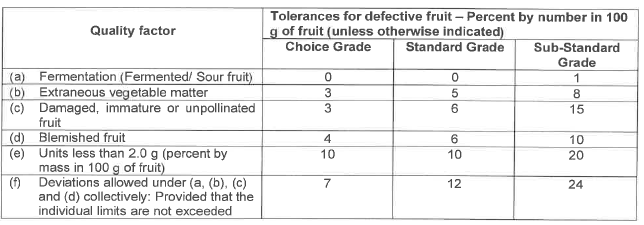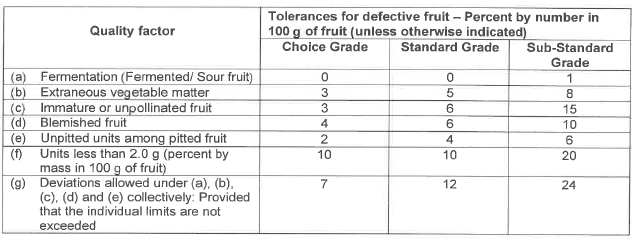Definitions
| (1) |
Where used specifically with regard to whole dates— |
means cane sugar varieties or invert sugar varieties as contemplated in sub-regulation (2);
means, in the case of unpitted dates only, fruit affected by mashing, tearing, breaking of the skin, leaving the kernel visible so that the appearance of the fruit is noticeably affected;
means fruit light in mass, stunted or distinctly rubbery in texture; and;
means fruit not pollinated, as indicated by stunted growth, immature characteristics and absence of pit.
Quality standards
Commercial types and varieties
| (a) |
Dates shall be classified as follows based on the nature of their principal sugar component. The list of commercial types and varieties mentioned below is, however, non-exhaustive: |
| (i) |
Cane sugar commercial types which contain mainly sucrose, include the following varieties: |
| • |
Daglat Beidha (Deglet Beidha). |
| • |
Daglat Noor (Deglet Nour). |
| (ii) |
Invert sugar commercial types which contain mainly glucose and fructose, include the following varieties: |
| • |
Medjoul (Majhoul; Medjool). |
| (a) |
The maximum moisture content for whole dates and date blocks shall be as follows: |

| (b) |
In addition to the general quality standards set out in regulation 5, whole unpitted and pitted dates shall— |
| (i) |
be ripe and plump, where applicable; |
| (ii) |
be intact in the case of whole unpitted dates; |
| (iii) |
have the shape, development and colour characteristic of the variety and/or commercial type: Provided that Standard Grade dates may have slight defects in form or development; |
| (iv) |
be amber-coloured to brown: Provided that Standard Grade dates may have defects of colouration; |
| (v) |
have abundant flesh which is fat or semi-fat and greasy; |
| (vi) |
have a translucent epicarp, which, according to the variety, adhere to the flesh: Provided that Standard Grade dates may have slight defects of the epicarp that do not affect the pulp; |
| (vii) |
be uniform and each container shall contain only fruit of the same origin; and |
| (viii) |
be of the same variety: Provided that Standard Grade shall be of the same commercial type. |
| (c) |
In addition to the general quality standards set out in regulation 5, date blocks shall also comply with the following requirements— |
| (i) |
consist of compressed whole pitted dates packed in rectangular, or any other shape, blocks; |
| (ii) |
be free from blackened portions; |
| (iii) |
have an attractive and typical colour for Choice Grade fruit and be reasonably attractive and typical of the cultivar concerned for Standard Grade fruit; and |
| (iv) |
have a good and fleshy texture for Choice Grade fruit. |
Sizing
| (d) |
Whole pitted and unpitted dates shall, irrespective of the variety, have a minimum mass of 2.0 g. |
Permissible deviations
| (3) |
The maximum permissible deviations for whole unpitted dates are as follows: |

| (4) |
The maximum permissible deviations for whole pitted dates are as follows: |

| (5) |
The maximum permissible deviations for date blocks are as follows: |

Additional marking requirements
| (6) |
Subject to the provisions of regulation 10, the product name shall be "dates" or "whole dates" or "date block", as the case may be: Provided that— |
| (a) |
the expression "pitted" or "unpitted", as the case may be, shall be indicated as part of the product name in the case of whole dates only; |
| (b) |
the name of the variety or the commercial type shall be indicated either as part of the product name, or in close proximity to such name in the case of whole dates and date blocks: Provided further that if the variety or commercial type is not defined in sub-regulation (2), or cannot be guaranteed in the case of Standard Grade and Sub-Standard Grade, the expression "common" shall be indicated either as part of the product name, or in close proximity to such name. |
 Businesses Act, 1991 (Act No. 71 of 1991)
Businesses Act, 1991 (Act No. 71 of 1991)



